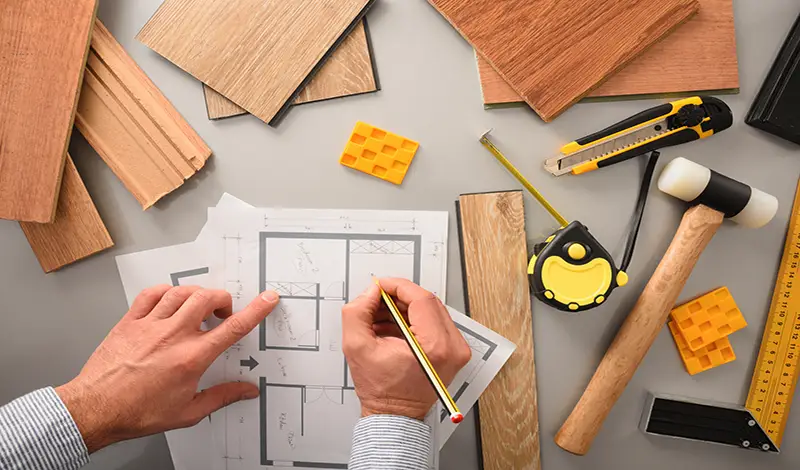How to Start a Home Renovation
Published on April 5, 2024 | 5 Minute read

Melanie
Ortiz Reyes
Content Specialist
A home renovation project can be an exciting yet daunting endeavor, but it can transform your living space and enhance its functionality, aesthetics, and value. Whether you're planning a minor update or a major overhaul, thorough preparation and strategic planning are essential for a successful renovation journey. Here’s how to start a home renovation:
Define Your Goals and Priorities
Take a critical look at your home and identify areas or features that require renovation or enhancement. Common areas include kitchens, bathrooms, living spaces, and outdoor areas.
Define your renovation goals and priorities. Determine whether you're aiming to improve functionality, modernize aesthetics, increase energy efficiency, accommodate lifestyle changes, or enhance resale value. Clear objectives will guide your decision-making throughout the project.

Establish a Realistic Budget
Assess your financial situation and determine how much you can realistically allocate to the renovation project. Consider factors such as savings, loans, home equity, and potential financing options.
Break down your budget to allocate funds to different aspects of the renovation, including materials, labor costs, permits, design fees, contingency reserves, and unexpected expenses. Prioritize essential elements while allowing flexibility for adjustments.
Gather Inspiration and Ideas
Research and explore different design styles, themes, colors, and trends that align with your preferences and vision for your renovated space. Create mood boards, gather inspiration from magazines, websites, and social media platforms, and consult with design professionals if needed.
Visit home improvement stores, showrooms, and suppliers to view and touch materials such as flooring, cabinetry, countertops, tiles, paint colors, and fixtures. Collect samples and swatches to visualize how different elements will come together in your space.

Plan and Design Your Renovation
Engage with architects, interior designers, or design-build firms to conceptualize and plan your renovation project. Collaborate closely to translate your ideas into detailed plans, drawings, and specifications that meet building codes and regulations.
Determine the permits and approvals required for your renovation project based on local building codes and regulations. Work with your design professionals to prepare and submit permit applications accurately and in a timely manner.
Select Reliable Contractors and Suppliers
Solicit bids and quotes from reputable contractors, builders, and tradespeople for your renovation work. Evaluate their experience, expertise, references, and portfolio of past projects before making hiring decisions.
Select high-quality materials, finishes, and products that align with your design vision, budget, and performance expectations. Consider factors such as durability, maintenance requirements, warranties, and eco-friendly options.

Prepare Your Home and Schedule the Work
Declutter and remove furniture, belongings, and fixtures from the renovation areas. Protect remaining surfaces and belongings from dust and damage during construction.
Work with your contractors to develop a detailed project timeline and schedule that outlines tasks, milestones, and deadlines. Communicate regularly to track progress, address any challenges, and make timely decisions.
Monitor Progress and Quality
Visit the renovation site regularly to monitor progress, ensure adherence to plans and specifications, and address any concerns or adjustments needed. Maintain open communication with your contractors and project team.
Inspect workmanship, installations, and finishes to ensure quality standards are met. Address any deficiencies or issues promptly to maintain project momentum and achieve desired results.

Finalize Details and Finishing Touches
Coordinate installations of plumbing fixtures, lighting fixtures, cabinetry, countertops, flooring, tiles, paint, and other finishing touches according to the project schedule.
Conduct a final walkthrough with your contractors to review completed work, identify any remaining tasks or touch-ups, and ensure satisfaction with the finished renovation.
Celebrate Completion and Enjoy Your New Space
Celebrate the successful completion of your home renovation project with family, friends, and the project team. Recognize and appreciate the effort, creativity, and collaboration that went into transforming your living space.
Personalize your newly renovated space with furniture, decor, and personal touches that reflect your style and preferences. Take time to enjoy and appreciate the enhanced functionality, comfort, and aesthetics of your revamped home.
Starting a home renovation project requires careful planning, budgeting, design considerations, and collaboration with experienced professionals. By following these key steps and considerations, you can navigate the renovation process effectively, minimize stress, and achieve the desired results that enhance your living experience and property value. Whether you're updating a single room or undertaking a whole-house renovation, strategic planning and attention to detail ensure a successful and rewarding renovation journey.